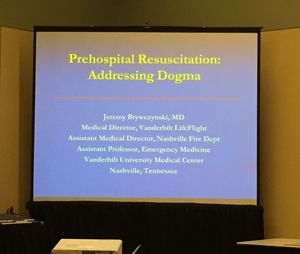Dr. Jeremey Brywczynski, from Nashville, Tenn. discussed some of the dogma related to out-of-hospital cardiac arrest resuscitation in the EMS Today new speaker forum. He specifically dug into the administration of epinephrine, and reminded the audience that the gold standard of resuscitation should be neurologically intact survival-to-hospital discharge. He reviewed pertinent research with helpful analysis and a light-hearted delivery style.
Prehospital resuscitation: Research does not support benefit of epinephrine
The Nakahara study in Japan compared cardiac arrest patients; those that got epi and those that did not. One month post arrest neurological survival was the same in patients that had a v-fib/v-tach arrest. For patients in PEA/asystole there was no statistical difference in survival.
 The Jacobs et al trial in Australia was a double-blinded placebo controlled prospective study compared epinephrine versus placebo. The primary outcome was discharge to hospital. Although epinephrine significantly increases ROSC there was no benefit of epinephrine on survival to discharge.
The Jacobs et al trial in Australia was a double-blinded placebo controlled prospective study compared epinephrine versus placebo. The primary outcome was discharge to hospital. Although epinephrine significantly increases ROSC there was no benefit of epinephrine on survival to discharge.
Hagihara study analyzed 400,000 cardiac arrests over 4 years. Patients that received epinephrine had much more likely ROSC. One month survival and neurological status were much more likely for patients that did not receive epinephrine.
“I imagine a future where epinephrine is optional in cardiac arrest resuscitation,” said Brywczynski.













